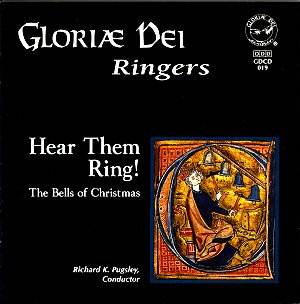I have to admit that the prospect of listening to L’Arlésienne
on the handbells is not one that sets my soul ablaze. I don’t ordinarily
yearn to hear The Twelve Days of Christmas interpreted
by an ensemble of bell ringers, nor does Ding Dong! Merrily on
High often appear on my insouciant lips as I saunter through
life’s corridors. Thus the appearance of Gloriæ Dei Ringers’ disc
‘Hear Them Ring!’ met with my sotto voce response ‘Not If I Can Help
It’.
Boy, was I wrong. These virtuosi of metal and mallet
positively palpitate with imagination and their arrangements are the
ne plus ultra of shimmering, quivering pulsating pulchritude.
Did Bizet imagine his immortal masterpiece would be visited by an ensemble
of metal manglers? Well it has been and rather gloriously too, a fresh
air, outdoors arrangement by Frances Legge Callahan summoning up twangy
sonorities and pedal notes, a delicious range of colours – including
plucking and martellato effects. There are eleven players in this plucky
Massachusetts group directed by Richard K Pugsley – their singing compatriots
in Gloriæ Dei Cantores are directed by Elizabeth C Patterson so
maybe middle initials are especially prized in their neck of the woods
– and they use 79 Malmark handbells (of 6 ½ octaves). Twas Christmas
Eve receives a rather suggestive reading that ends in Renaissance
dignity whilst the witty colouration of The Twelve Days of Christmas
is full of pitch extremes and glittering sonorities, like stars exploding.
Away in a Manger is saturated in impressionistic ostinato; if
you think handbells are inflexible creatures listen to the dynamic variance
cultivated by these patrician East Coast ringers. They wouldn’t rouse
a butterfly’s eyelids with the spectral quiescence of their Malmarks.
A Flight of Angels is rhythmically novel; the
sound of mallet on bell is distinctive as elsewhere the piping of shepherds
in Shepherds, Watching is conveyed through simplicity and delicacy.
Altogether their ensemble is metaltight, the sonorities they conjure
full of lithe and pleasurable novelty. Perhaps in a spirit of tintinnabulist
affinity let me quote the work of another patrician American composer,
Duke Ellington, and his clearly prescient masterpiece, Ring Dem Bells.
Jonathan Woolf

